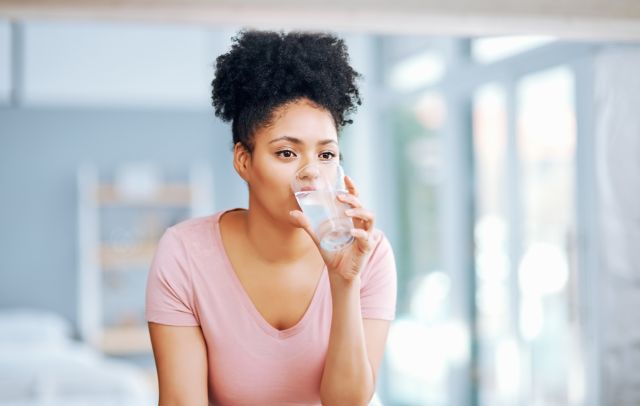Updated on November 9, 2023.
No matter your age, it’s important to take care of your skin. As you grow older, it may become a bigger challenge.
Moisturizing daily, washing your face before bedtime, and regularly applying sunscreen can go a long way toward maintaining and improving skin appearance and health. But did you know your diet can contribute, too?
It’s true. Eating too many foods that are processed, high in added sugar, or high in saturated fat may play a role in adult acne, skin damage, and skin conditions like psoriasis. On the other hand, eating fruits, vegetables, lean proteins, healthy fats, and whole grains can help keep your skin healthy.
In large part, that’s because adopting a nutritious, well-rounded diet contributes to better overall well-being, which affects the look, feel, and general state of your skin. But it may also have to do with specific nutrients in healthy foods, such as the following.
Omega-3 fatty acids
Omega-3s are healthy fats that help keep your heart in good shape and protect against stroke. They also strengthen your skin’s natural barrier so it can better retain moisture and help lower inflammation in the body that may contribute to skin issues.
Your body can’t produce omega-3s by itself; they have to come from supplements or food. Walnuts, chia seeds, flaxseed, soybeans, tofu, and oily fish such as salmon, trout, and albacore tuna are all good sources. The American Heart Association recommends eating 3 ounces of fish rich in omega-3 fatty acids twice a week.
If you’d like to try supplements like fish oil, be sure to talk to your healthcare provider (HCP) before you start. High doses may cause diarrhea, gas, and nausea, and if you’re taking blood thinners, omega-3 supplements may increase your bleeding risk.
Vitamin D
You may know that vitamin D helps your body absorb calcium, promoting healthy bones—and that it contributes to the health of your muscles, nerves, and immune system. But this crucial nutrient can also help manage inflammation, maintain a healthy skin barrier, and may even assist with wound healing.
On the other hand, not getting enough vitamin D is linked to a higher risk of several skin conditions, including eczema and psoriasis. If you’ve already been diagnosed with one of these conditions, a vitamin D deficiency is associated with more severe symptoms.
About one-third of U.S. adults don’t get enough vitamin D, which comes from three essential sources:
- Food: Good sources include fatty fish such as trout, salmon, and mackerel. Because few foods naturally contain vitamin D, many are fortified with the nutrient. Fortified items include cereal, yogurt, and orange juice.
- Supplements: Widely available in liquid or pill form, vitamin D supplements may be recommended for some people. As with omega-3s, you should speak with an HCP before adding vitamin D supplements to your daily routine. They may interact with medications, and getting too much can be harmful.
- Sun: Spending time outdoors can raise your vitamin D levels—but too much sun can increase the risk of skin cancer. Because of this, the American Academy of Dermatology recommends that healthy adults get their vitamin D from food.
Antioxidants
Free radicals are harmful chemicals that damage your body’s cells. In terms of your skin, they’ve been linked to cancer, inflammation, and sun damage.
Antioxidants are substances that protect against free radicals, helping to safeguard your skin. There are hundreds of different antioxidants. Your body produces some, but they can also be found in fruits, vegetables, whole grains, and some meats, among other foods.
Here are some more common antioxidants, as well as foods that are good sources:
- Vitamin A: leafy greens, carrots, sweet potatoes, broccoli
- Vitamin C: citrus fruits, peppers, kiwi, broccoli, cantaloupe, tomatoes
- Vitamin E: wheat germ, sunflower oil, safflower oil, nuts, sunflower seeds
- Lycopene: tomatoes, watermelon, apricots, grapefruit
- Lutein: eggs, spinach, kale, kiwi, zucchini, grapes, winter squash
- Manganese: brown rice, oatmeal, nuts, lentils, leafy greens
- Selenium: seafood, meat, poultry, eggs, dairy, breads, cereals
Some antioxidants, such as vitamins C and E, can also be found in skincare products. Speak with a dermatologist or other HCP about whether they’re the right choice for you.
What about water?
Among many other benefits, good old H20 helps promote healthy digestion, maintain energy levels, and regulate body temperature. But will drinking plenty of water really boost your skin’s appearance?
Sadly, there’s little evidence suggesting this is true. Research generally hasn’t shown that getting enough water will slow the skin’s natural aging process, or that drinking excessive amounts increases skin’s natural moisture. For that, you’re better off applying moisturizers regularly, avoiding irritating skin products, and using a humidifier.
Still, like eating a healthy diet, staying hydrated can help maintain overall well-being, which promotes healthy skin. If you’re having trouble getting enough water, try carrying a water bottle with you, or adding fresh lemon, lime, or berries to your water to make it more flavorful.







